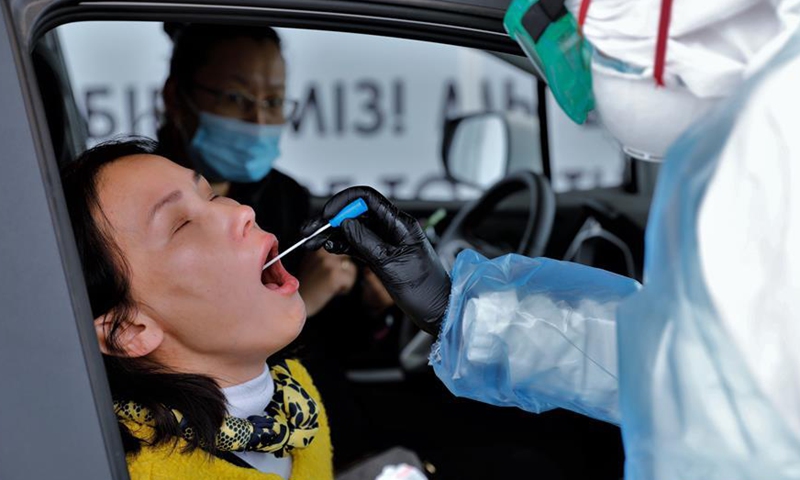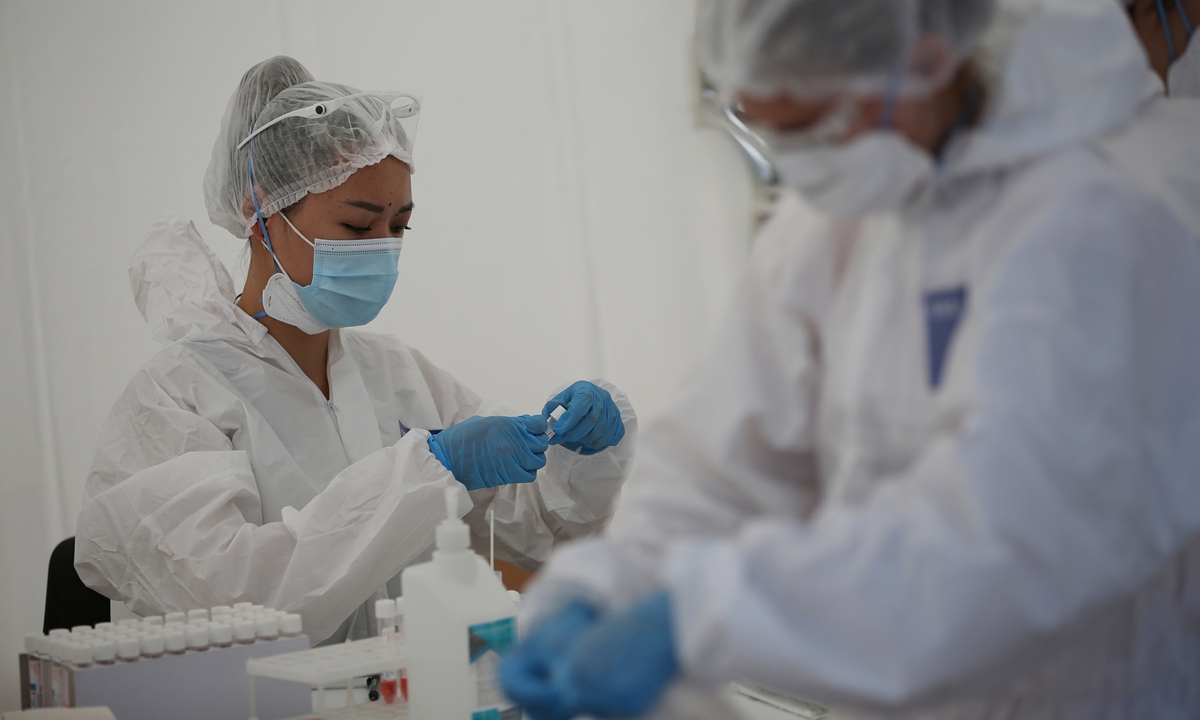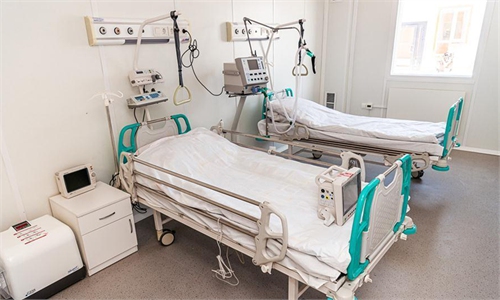Chinese officials, medical experts expect more information from Kazakhstan on 'unknown pneumonia'

A woman receives a swab test at a mobile test site in Nur-Sultan, Kazakhstan, June 16, 2020. Kazakhstan sets up new mobile rapid swab test sites to fight against the COVID-19 epidemic.Photo:Xinhua
The Chinese Embassy in Kazakhstan on Thursday warned Chinese citizens living in the country of a local pneumonia of unknown source, which local media reported has a "much higher" fatality rate than COVID-19. Organizations including Kazakhstan's health department are studying the "virus of this pneumonia," the embassy said, quoting media.
The unknown pneumonia in Kazakhstan caused 1,772 deaths in the first six months of the year, with 628 in June alone and including Chinese citizens, the embassy said in a statement on its WeChat account on Thursday, citing Kazakh media reports.
However, the Ministry of Health of Kazakhstan on Friday refuted reports about an unknown pneumonia in the country.
The ministry also said in a post published on Facebook on Friday that the country continues to monitor pneumonias in line with the World Health Organization's classification. It says that Kazakh Minister of Health Alexey Tsoy told a media briefing on Thursday that there are bacterial, fungal, viral and "unspecified" pneumonias in the country, saying that proves the reports from Chinese media are untrue.

Kazakhstan File photo:VCG
A media report claiming the number of patients affected by the pneumonia in Kazakhstan "is two to three times higher than that of COVID-19" came from Kazakh international news agency Kazinform on Thursday, but was deleted on Friday.
Based on the little information disclosed thus far, it is difficult to conclude whether the pneumonia found in Kazakhstan is COVID-19 or a new pneumonia, Wang Guangfa, a leading Chinese respiratory expert at Peking University First Hospital in Beijing, who was also among the first group of experts dispatched by the Chinese National Health Commission to Wuhan in early January, told the Global Times.
"Local health authorities should clearly state what the situation of patients is. It's also likely that local authorities lack the capabilities to diagnose COVID-19," he said.
There are many kinds of viral pneumonia. Doctors are sometimes unable to confirm pneumonias through clinical diagnosis, Wang said, noting that in some remote areas in Kazakhstan, local hospitals do not have adequate testing means and cannot diagnose pneumonia.
Since mid-June, some regions and cities, like Atyrau Region, Aktobe State and Shymkent, have recorded higher pneumonia cases than the same period last year. Some local observers said there is still a huge gap between Kazakhstan and developed countries in medical resources and capacity to fight COVID-19, though the level is higher in Nursultan, capital of Kazakhstan, than other areas in the country.
Jin Dongyan, a professor at the School of Biomedical Sciences at the University of Hong Kong, told the Global Times on Friday that there is a big possibility that this "unknown pneumonia" is actually COVID-19, and local authorities were unable to identify it in a timely manner due to poor medical conditions. He said the chances that the coronavirus has mutated are very low.
He noted that Chinese people returning from Kazakhstan have been diagnosed with COVID-19, but there have been no cases of this unknown pneumonia among them.
The negative COVID-19 tests may be the result of Kazakhstan's improper use of testing kits, and the reportedly high fatality may be caused by a low number of patients seeking medical treatment, Jin said.
Xu Min, a doctor from Xinjiang who was a member of the medical aid expert team that China sent to Kazakhstan in April, told the Global Times on Friday that the medical situations vary greatly in the country, and many places lack adequate equipment. The medical team visited three cities - Nursultan, Karaganda and Almaty.
Xu said in many hospitals they visited, patients and medical staff shared the space and some patients did not even wear face masks.
While China also uses CT scans to help diagnose COVID-19, Kazakhstan only uses X-rays, which may lead to inaccurate diagnosis, Xu noted.
China expects to learn more about this unknown pneumonia and hopes to work together with Kazakhstan to fight the epidemic and safeguard public health safety in both countries, Chinese Foreign Ministry spokesperson Zhao Lijian said on Friday.
The unknown pneumonia has given rise to heated discussions among Chinese people living in Kazakhstan, who remain anxious about COVID-19, and some Chinese students are becoming more eager to return to China as the situation worsens.



